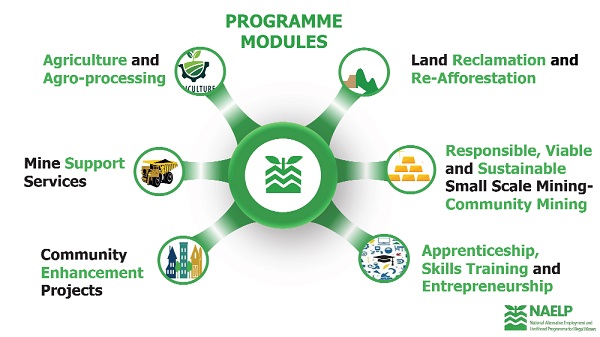
NAELP makes inroads: 80,000 Secure jobs in reafforestation
The National Alternative Employment and Livelihood Programme (NAELP) has provided jobs for 80,000 people whose lives were dependent on illegal mining and those who were likely to enter that trade.
The beneficiaries have been deployed mainly into the land restoration and re-afforestation programme, the first module of the NAELP.
Advertisement
Direct and indirect jobs were created by the programme, and while some of the jobs created were permanent, others were temporary.
Giving an update one year into the programme in an interview with the Daily Graphic, the Coordinator of NAELP, Dr Louise Carol Serwaa Donkor, said all the beneficiaries were from five endemic illegal mining communities.
She named the communities as Adinkra and Fufuo in the Ashanti Region, Akwatiakwaso in the Eastern, Akotm in Western and Terchire in Ahafo.
As part of the programme, some of the beneficiaries also helped to nurse and plant 20 million economic seedlings, an initiative which was anchored on the Green Ghana project.
Fighting illegal mining
Last year, NAELP was launched by President Nana Addo Dankwa Akufo-Addo as part of national efforts to curb illegal mining, otherwise known as galamsey.
The objective was to be an exit route for those whose means of livelihood directly or indirectly depended on galamsey, which has become a menace.
According to environmental researchers, Ghana lost about 1.41 million hectares of tree cover between 2001 and 2021, equivalent to a 20 per cent decrease in forest cover, a situation being made worse by illegal mining, even in forest reserves.
Other modules
The other modules under NAELP are agriculture and agribusiness, apprenticeship and entrepreneurship, responsible, viable and sustainable small-scale mining, also known as community mining, as well as mine support services.

It is a purely government-funded programme and it is being implemented, to a large extent, in collaboration with stakeholders, such as municipal and district assemblies (MDAs), chiefs and communities.
Better alternative
Dr Donkor said concerning the land restoration module, the programme was targeting to reclaim 1,000 hectares of land within the five selected communities, with the focus on restoring forest reserves and water bodies which had been marked as red zones.
The aim, she explained, was to generally improve the land and soil destroyed by illegal mining activities into better land use purposes.
As part of the process, technical persons, such as environmentalists, geo-spatial experts and geologists, had been deployed to provide expertise and support for the beneficiaries on restoration before the reafforestation took place, she added.
Chemical pollution
She explained that that was being done because in some communities the level of chemical pollution was so high that it had to be assessed to determine which kinds of seedlings would be required.
“The plan is to have economic trees — mainly palm and timber — for the reafforestation, but in some areas, due to the level of chemical pollution, it is not worth it to have palm seedlings, given the use of that tree.
“So in places where palm seedlings will not be good, other trees which will be equally beneficial economically are planted,” she explained.
Initial difficulties
The NAELP Coordinator said despite the initial difficulties, her outfit had managed to get the beneficiaries to buy into the programme “because it is really the alternative to their activities, which are not only illegal and criminal but also detrimental to their own health and that of the communities”.
She said the programme was succeeding because the affected communities were witnessing the devastating impact of galamsey and were ready to try the alternative means to survive.
Remuneration
Permanent workers under the programme receive GH¢700 monthly, after tax and social security contributions.
They are under a contract, so the contractor pays their SSNIT contributions and taxes.
In addition, they are given breakfast and lunch every day.
The casual workers receive an average of GH¢2,000 a month, with a daily amount of GH¢100, on the average.
Their job involves filling poly sacks, so the more bags they are able to fill, the more money they earn.
The amount, Dr Donkor said, although might seem inadequate, compared to what they might earned in their illegal activities, it was still a better alternative, adding: “Galamsey is not sustainable and they are all witnessing the devastating impact — water bodies are being heavily polluted and the illegal practice is becoming riskier because the pits they dig also end up becoming traps to them.”
Implementing other modules
Asked when the other modules would be rolled out, Dr Donkor said so far most of the beneficiaries had shown more interest in the reafforestation, the community mining and the mine support services modules and the programme would be planning towards the other modules.
She stressed that while the government was in support of small-scale mining, as it had played a significant role in the sector, it was against irresponsible and destructive mining, hence the fight against galamsey, which was carried out without any consideration to the environment.
“President Akufo-Addo has been emphatic about the government’s support for small-scale mining. So what he has charged NAELP to do is train people to undertake responsible, viable and sustainable mining, which is also called community mining.
“This will be done along with timely, concurrent land reclamation and decommissioning by small-scale miners and thus help with the reafforestation programme,” she stressed.
She explained that under the community mining module, NAELP would build the capacity and skills of artisanal and small-scale miners in sustainable and responsible mining, using the University of Mines and Technology (UMaT) and others as resource centres.



